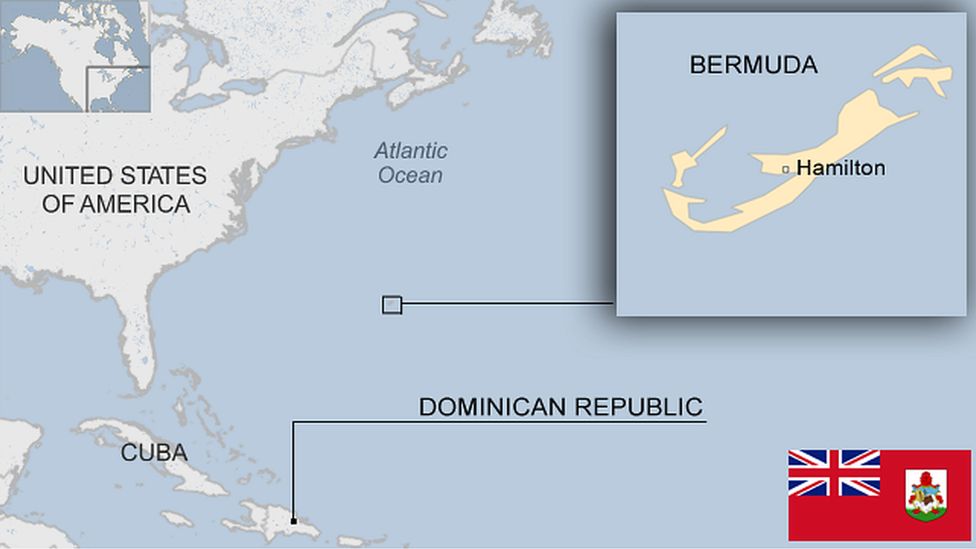Bermuda profile
- Published

Bermuda, a densely-populated British overseas territory in the western Atlantic Ocean, has one of the world's most prosperous economies, largely because of its offshore finance industry.
Beaches, golf courses, colonial buildings and the subtropical climate makes the territory an attractive tourist destination.
The 16th Century Spanish explorer, Juan de Bermudez, is believed to have discovered the archipelago of seven main islands and more than 170 islets. England took control of Bermuda in the late 17th Century and slaves, mostly brought from Africa, came to outnumber the colonists. Today, three-fifths of the population are of African descent with the remainder of mostly-European extraction.
The 1968 constitution guaranteed internal self-government but tension in the 1970s saw the assassination of the colony's governor and rioting. British troops went in to restore order. Recent polls show a large majority opposed to independence.
Bermuda featured in the 2017 leak dubbed the Paradise Papers, which reveal the financial dealings of politicians, celebrities, corporate giants and business leaders.
BERMUDA: FACTS
- Capital: Hamilton
- Area: 53.2 sq km
- Population: 63,900
- Language: English
- Life expectancy: 78 years (men) 86 years (women)
- Read more country profiles - Profiles by BBC Monitoring
LEADERS
Head of state: King Charles III, represented by a governor
Premier: David Burt
David Burt became Bermuda's youngest premier when his Progressive Labour Party (PLP) won the July 2017 general election. The PLP took 24 out of the 26 seats in the House of Assembly.
The territory is believed to have one of the oldest parliaments in the world; a representative assembly was established in 1620.
Black Bermudians, primarily descended from African slaves, make up around 50% of the population, while White Bermudians, primarily of British, Irish and Portuguese descent, account for 30%.
MEDIA
The islands' broadcasting scene is dominated by two commercial players, the Bermuda Broadcasting Company and VSB.
As well as home-grown broadcast media, most homes and hotel rooms have access to the multichannel, international offerings of cable and satellite TV services.
TIMELINE
Some key dates in the history of Bermuda:
c.1503 - Spanish sea captain Juan de Bermudez sights the islands.
1609 - First English settlers accidentally arrive after being diverted by a storm from reaching Jamestown in Virginia.
1612 - The Virginia Company begins to settle the archipelago, officially named Virgineola. New London (renamed St George's Town) is the colony's first capital and is the oldest continually inhabited English town in the New World.
1615 - The colony, renamed the Somers Isles, is passed on to the Somers Isles Company.
17th Century - African and American Indian slaves are brought to the islands in the early 1600s and soon outnumber white settlers.
1684 - The Somers Isles Company is dissolved and Bermuda becomes a crown colony.
1811 - After US independence, Bermuda becomes strategically important for the UK, and work begins on the Royal Naval Dockyard, which becomes Britain's base for securing western Atlantic trade.
1861-65 - Bermuda is used by Confederate blockade runners during the US Civil War.
1920-33 - Bermuda is a centre for alcohol smuggling into the US during Prohibition in the US
1930 - The protectionist US Smoot-Hawley Tariff Act leads to the decline of Bermuda's once-thriving agricultural export trade to America and encourages the development of tourism.
1968 - New constitution introduced.
1973 - Amid political tensions and calls for independence - and six months after the killing of Bermuda Police commissioner George Duckett - governor Sir Richard Sharples and his aide are shot dead by assassins linked to a small militant Bermudian Black Power group.
1977 - Three days of rioting follow the execution of Sharples' murderer and his co-accused. A state of emergency is declared and British troops are flown in to restore order.
1995 - Independence referendum: pro-independence Progressive Labour Party (PLP) encourages voters to boycott poll. Majority votes against independence.
2003 - Hurricane Fabian, worst storm in 50 years, sweeps across Bermuda with winds of up to 125mph.
2009 - Bermuda added to OECD's "white list" of countries complying with internationally agreed tax standards, after signing information exchange agreements with several countries.
2012 - One Bermuda Alliance (OBA) wins general election, ending PLP's three straight terms in office.
2017 - David Burt becomes Bermuda's youngest premier when the PLP wins the July general election.
2018 - Bermuda becomes the first country to repeal same-sex marriage, just a year after campaigners win a case in the Bermuda Supreme Court for marriage equality for LGBTQ+ people , community, taking away the rights of gay couples to marry and given them instead the option of civil partnerships.
Related Topics
- Published20 June 2023
- Published4 August 2023
- Published29 August 2023
- Published31 March 2023
- Published27 March 2023
- Published25 August 2023
- Published25 August 2023